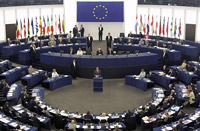At the beginning of this month in 27 countries of the EU the elections of European Parliament’s supreme body took place.
The main outcome of the election was that the rightist parties (conservatives) were able to maintain the majority in the European Parliament. The right centrist European People’s Party or as it’s known to call them – the European democrats, received 264 out of 736 deputy mandates. The second place is occupied by the socialists with 161 mandates. In the European Parliament the liberals also received mandates – 80 mandates, the greens received 53 mandates, the united leftists received 32 seats, the union of European nations received 35 mandates and the independent MPs have 18 mandates. The so-called “others” (among which are the radical rightist parties) received 93 mandates. Thus, according to election results, there have been no drastic and essential changes in the European Parliament. This comes to prove that the European Parliament will principally retain its main directions of activity and priorities. One of the many interesting facts revealed during the June 4-7 elections is that the conservatives received more votes than the social-democrats. In the opinion of the analysts this means even in the current difficult conditions of the global crisis in most of the states of the EU people believe in the financial system and the possibility of its “renaissance.” Nonetheless, the sensation of these elections, in the opinion of the majority of the monitors, is that for the first time in history the radical British National Party (which is against the immigration policy of the government) received a manatee in the European Parliament. This happened in the case when the dominant party of the Great Britain – the Labor Party occupied only the third place in the outcome of the elections of the EU Parliament. The leading party is the oppositional conservative party and the second place was occupied by the British Party of Independence, which supports the idea that the Great Britain should deflect from the EU. The next importance hue of the elections of the European Parliament, which is actively speculated by the people, is the lowest turnout of voters in the history of EU. Only 43.2% of 375 million voters participated in the elections. This is a unique record. For a comparison let us mention that 30 years ago 2/3 of the voters participated in the elections of the European Parliament. This time less than half of the voters participated in the election. In some countries the turnout was less than 1/3. The lowest turnout was in Lithuania – only 15.7%. During the newly independent history of Lithuania – the past 18 years, this is the only case when the voters are ignoring the elections. In general, in all of Europe it is noticed that people are getting apathetic about elections. In the opinion of the analysts, the main reason is the global crisis. It affects the moods of people and they are not able to orient which political course to vote for. They don’t know which of the parties has the capacity to demonstrate the best intellect and organizational skills to withstand the current challenges.
This supplement has been produced with the assistance of the European Union. The content of this supplement is the sole responsibility of “168 Hours” Newspaper and can in no way be taken to reflect the views of the European Union

